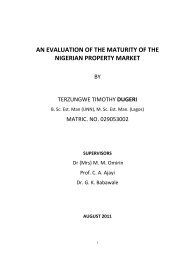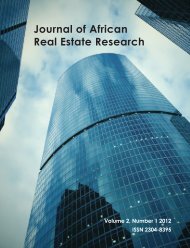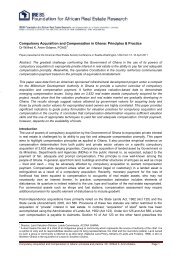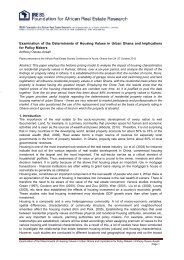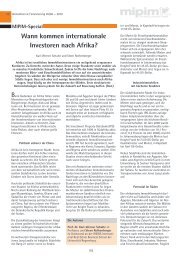COTE D’IVOIREANYRAY & PARTNERS LAW OFFICESFirm InformationWebsite address: www.anyraypartners.comLanguages spoken: French and EnglishContact: Mr Ika Raymond Any-GbayéréTelephone: +225 22 444 524Fax: +225 22 449 120Email: lawyers@anyraypartners.comCountry InformationThe Ivory Coast covers an area of 322 462 square kilometres andhas a population of about 20 million inhabitants includingforeign residents. As a former French colony, its official languageis French and its currency is the CFA Franc (FCFA).The population is mainly rural. There are five important ethnicgroups:In the north the Senoufo group;In the north west the Malinké;In the west, the Mandé group and the Wê group;In the south-west and west, the Krou group;In the centre, the south and the east, the Akan group.The north of the country is a grassy savannah, the centre issavannah and the south is forested. In the west there aremountains including Mont Nimba, the highest of the country(1 753m). The climate is essentially tropical, but in the norththere are dry hot winds during November to February. In all theregions there are two seasons, a dry and rainy one.Political System and Investment EnvironmentA civil war began in 2002 between the north and the south andled to serious political instability and economic dislocation. Adisputed election in 2010 plunged the country into a politicalcrisis which resulted in the removal of President Gbagdo and MrQuattara becoming President. The security situation hasimproved and investors are slowly returning. Before the civilwar, the country was one of the largest economies in West <strong>Africa</strong>with several large local firms (like SIR, Petroci, Port d'Abidjan,Port De San Pédro and Sotra) and multinational investors likeUnilever-Côte d’Ivoire, Orange-Côte d’Ivoire, SGBCI-Côted’Ivoire, BICICI, Nestlé-Côte d’Ivoire, GMA, Bolloré, Total-Côted’Ivoire, Shell-Côte d’Ivoire, Bouygues and SAGA-Côte d’Ivoire.Investment IncentivesIn addition to investment incentives under the Investment Codeof 1995, the following tax reforms have been introduced by theGovernment to promote investment:tax on profits is now 25% for legal entities and 20% forindividuals instead of 35%;Value Added Tax (VAT) is fixed at the rate of 18%;individuals and legal entities which invest a part or all oftheir profits in the country, may obtain a remission of tax onthose profits and these benefits have been extended tocommerce, services and mining. The rates of this taxremission have also been increased. For example, for anyinvestment made in region A (Abidjan and surroundingtowns), the rate has increased to 30% from 25%. In region B(the rest of the country) the rate has increased to 40% from35%;a specific tax incentive scheme is planned for companiescreated from 1 January 2010 to 31 December <strong>2012</strong> andinvolved in agribusiness (especially cotton and cashewnuts) in the centre, north and western parts of the country(which were particularly badly affected by the civil war).These companies must be created, re-established or reopenedbefore 31 December <strong>2012</strong> to benefit from theseincentives which include:#an exemption from VAT on equipment and on firstreplacement parts and an exemption until 2015 (whichis reduced to 75 % for 2016 and 2017) from property tax,business tax, tax on industrial, commercial andagriculture or non-commercial profits and from payrolltax. The exemption from property tax is for 10 years forproperties involved in producing, preserving, packagingand processing food and other agricultural products;#the constitutions of qualifying companies are exemptfrom stamp duties and interest on loans granted byassociated companies are exempt from the tax on debtrevenue until <strong>2012</strong>;#credit granted by banks to these companies for theircreation, re-opening and re-establishment are exemptfrom a specific tax on outstanding loans;#companies carrying on product purchasing operationsare exempt from the tax on profits, VAT and business tax,if the value of their purchases do not exceed 15 % oftotal production.certain incentives (see below) are provided tobiotechnology and information/communicationtechnology firms in a free trade zone in Grand-Bassam.PrivatizationAccording to the law on privatization, the Government maytransfer its rights in state owned companies to privateindividuals or entities by a bid process and under the control of aprivatization committee. The privatization may be donethrough:transfer of assets;transfer of shares;renunciation of a pre-emptive right to subscribe for shares;share capital increases;mergers;dissolution or liquidation.The Government may restrict the shareholdings of foreigntransferees or local companies controlled by foreigners.Forms of BusinessPartnership;Co-operatives;Private limited liability company;Private unlimited liability company;Public limited liability company;Sole proprietorship;Joint venture.25
26Formation of a CompanyThe Centre de Promotion des Investissements en Côte D'Ivoire(CEPICI) is a ”one stop” body to assist investors with alladministrative and tax procedures including the formation of acompany. The formation of a company comprises the followingstages:preparing the articles of association;signature of the articles of association by the shareholders;registration of the articles of association;filing the articles of association with a court registrar;filing a declaration of payment with a notary;social and tax registration;publication of the incorporation.It takes about one month to comply with all these formalities.Exchange ControlsRule N° 09/1998/CM/UEMOA of the West <strong>Africa</strong>n Economic andMonetary Union (WAEMU), also known in French as UEMOA, ofwhich Ivory Coast is a member, requires that any foreignexchange transaction, fund movements and payments betweena WAEMU member and a non WAEMU country must be donethrough the Central Bank of West <strong>Africa</strong>n States (the BCEAO),post-offices or authorized agents. In addition, within WAEMU’sarea, the same restrictions apply to foreign exchangetransactions, fund movements and payments between aresident and a non-resident as well as loan transactions, theissue and selling of stock and fixed assets and foreign currencycessions. However, the following payments are exempt:allowances to residents who travel abroad;any money transfer which does not exceed FCFA300 000;certain payments for example relating to the delivery ofmerchandise, salaries and fees, royalties, interests anddividends, dowries, estates and tax.TaxationAny company which undertakes activities in Ivory Coast mustregister with the tax authorities in order to obtain a tax payeridentification.Corporate tax on profits made in the Ivory Coast is levied at therate of 25% for companies and 20% for individuals.Business tax is paid by any person exercising a professionalactivity in the territory of the Ivory Coast. The tax is calculatedhaving regard to turnover (0.5%) and the rental value of thebusiness premises (18.5%).Value Added Tax (VAT) is payable at the rate of 18% on all servicesand sales of goods provided and performed within the IvoryCoast as well as on imports.Property tax is payable annually by the land owner.Taxes are payable on salaries at the rate of 1.2% for localpersonnel and 10.4% for expatriates.Stamp duties are paid with regard to the incorporation ofcompanies depending on the company'sshare capital, namely until FCFA 5 billion, therate is 0,6 % of the share capital and overFCFA 5 billion, the rate is 0,2 % of the sharecapital.There is a tax on securities incomes (from 10% to 18 %) and a taxon debt revenues (from 1% to 18 %).The general tax code provides a simplified tax regime for the oilsector. Several taxes such as the tax on industrial and commercialprofits, the tax on securities, payroll taxes, general income taxand tax on insurance contracts are calculated at 10% of the firm'sturnover.Companies must register with the CNPS in order to acquire asocial security number and pay monthly or quarterly employees’social security contributions. They must also pay contributionswith regard to apprenticeships and the continuing training ofemployees to the FDFP.Imports/ExportsImporters require permits and certificates from, and must beregistered with, the Ministry of Trade. In addition and dependingon the products imported, an importer may be required toobtain a certificate from the relevant ministry (e.g. the import ofmedicine requires a certificate from the Ministry of Health).Permits and certificates are also required for export activities.For example, only authorized companies and cooperatives canexport cocoa and coffee from the Ivory Coast.Monetary PolicyAs a member of the West <strong>Africa</strong> Economic and Monetary Union(WAEMU), the monetary policy of the Ivory Coast is defined bythe central bank of WAEMU (the BCEAO). The CFA Franc has afixed exchange rate with the Euro, namely 1 EURO = 655.957 CFAFranc.Legal SystemLike many former French colonies, the legal system is based onthe French civil law model.Intellectual PropertyPatents, trademarks, commercial marks, design or patterns areprotected by statute. The Ivory Coast is a member of the <strong>Africa</strong>nIntellectual Property Organization (OAPI), a treaty relating tointellectual property protection between 15 (mainlyFrancophone) <strong>Africa</strong>n countries. Registrations must be made inYaoundé, Cameroon.Financial Services/InsuranceBanks and financial institutions are governed by the rules of theWest <strong>Africa</strong> Economic and Monetary Union (WAEMU) of whichIvory Coast is a member. They are regulated by WAEMU’s BankCommission. There are 20 banks in the Ivory Coast.The insurance sector is expanding in the Ivory Coast. There are21 life insurance companies and 11 accident, fire and variousrisks insurance companies. There are also re-insurancecompanies which carry out their activities throughrepresentation offices. There are about 60 insurance brokers.Treaties and Bilateral AgreementsThe following treaties and bilateral agreements have beensigned by the Ivory Coast:bilateral conventions relating to double taxation signedwith France, Germany, Belgium, Norway, Canada, UnitedKingdom, Italy, Switzerland and Tunisia;bilateral conventions relating to the mutual protection of




